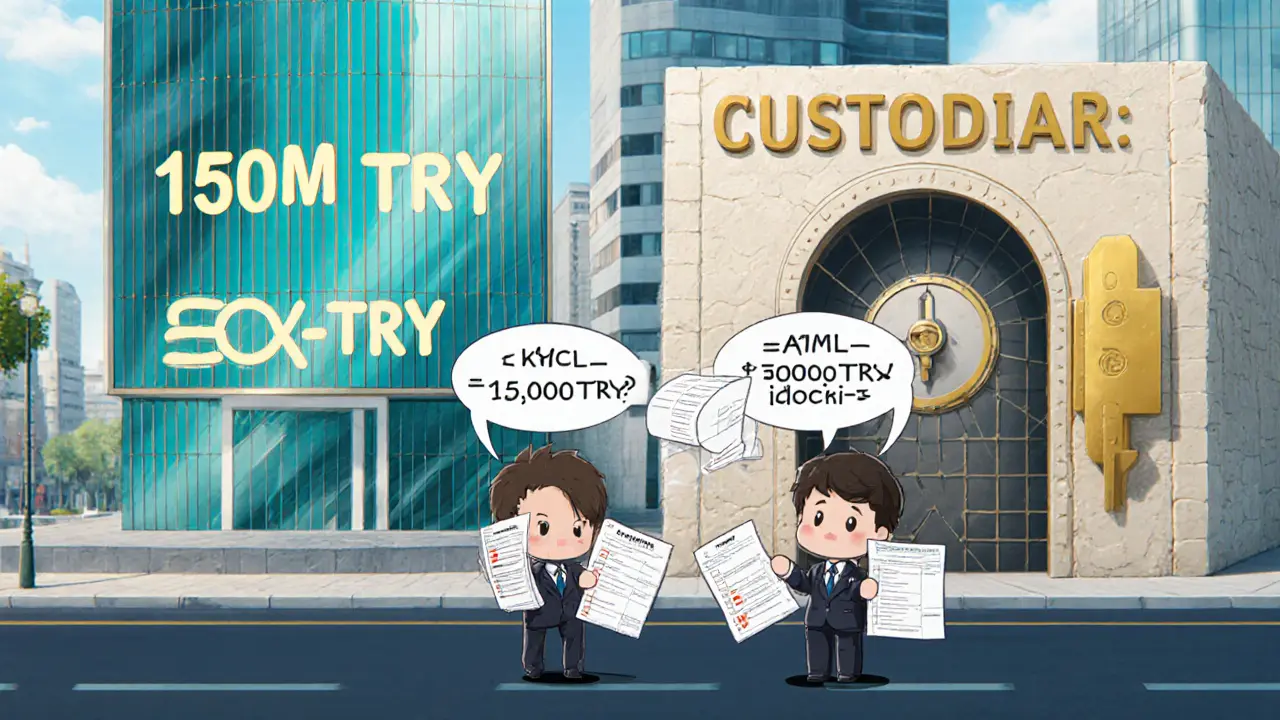Turkey Crypto Restrictions Calculator
Note: This calculator estimates compliance costs based on Turkish CBRT regulations. Actual costs may vary depending on operational scale and service offerings.
Estimated Annual Compliance Costs:
Capital Requirements:
Key Regulatory Obligations:
- AML/KYC verification for transactions over 15,000 TRY
- Transaction log retention for 5 years
- Monthly reporting of large FX conversions
- Annual compliance audit
Turkey's CBRT maintains a strict two-track approach to cryptocurrency regulation:
- Investment-Only: Cryptocurrencies are legal to own and trade, but they are not legal tender.
- Payment-Prohibited: Direct crypto payments for goods/services are forbidden.
- Licensed Providers: Only registered Crypto Asset Service Providers (CASPs) can operate.
- High Capital Thresholds: Exchanges need 150 million TRY, custodians 500 million TRY.
- Stringent AML/KYC: All transactions over 15,000 TRY require verification.
These regulations aim to preserve the Turkish Lira's legal tender status while allowing crypto as a speculative asset.
If you’ve been watching Turkey’s crypto buzz, you’ll notice a clear line drawn by the Central Bank: you can buy, sell and hold digital assets, but you can’t pay for a coffee with them. That split‑screen policy - investment‑only versus payment‑prohibited - is the core of today’s Turkey crypto restrictions. Below we break down what the rules look like on paper, how they affect exchanges, everyday traders, and where the market might head next.
TL;DR
- Cryptocurrencies are legal to own and trade in Turkey, but they are not legal tender.
- Only licensed Crypto Asset Service Providers (CASPs) can operate, with capital thresholds of 150MTRY for exchanges and 500MTRY for custodians.
- All transactions above 15,000TRY must undergo KYC verification and be reported to the Capital Markets Board.
- Direct crypto payments for goods, services, or real‑estate are prohibited; conversion to Turkish Lira must happen through a licensed exchange first.
- Violations can trigger fines up to 8MTRY and possible account freezes under upcoming MASAK powers.
What the CBRT’s Crypto Rules Actually Cover
When the Central Bank of the Republic of Turkey (CBRT) is the nation’s monetary authority, it sets the overall tone for digital‑currency policy, even though day‑to‑day supervision falls to other agencies., its primary stance is simple: protect the Turkish Lira’s monopoly as legal tender while allowing crypto as a speculative asset. The CBRT’s 2021 payment ban remains in force as of September2025, and the 2025 communiqués sharpen the licensing, AML, and reporting framework for service providers.
Licensing the Crypto Ecosystem: Who Can Operate?
All platforms that let users trade or store digital assets must be recognised as Crypto Asset Service Providers (CASPs) are regulated entities authorized by the Capital Markets Board to offer exchange, custodial, or related services.. To become a CASP, a company must:
- Register as a joint‑stock company with cash‑paid shares listed in the shareholders’ register.
- Submit a detailed business plan, proof of founders’ clean legal record, and a minimum capital pledge.
- Obtain formal approval from the Capital Markets Board (CMB) acts as the licensing authority for crypto‑related services in Turkey..
The capital thresholds are steep: 150million TRY (≈$4.1million) for exchanges and 500million TRY (≈$13.7million) for custodians. These figures aim to ensure only financially robust firms can survive market volatility and meet compliance costs.
Payment Prohibition: Why You Can’t Spend Crypto Directly
The CBRT’s April2021 decree bars any direct use of crypto for buying goods, services, or real‑estate. The rule forces a two‑step process for any purchase: first, convert the digital asset to Turkish Lira through a licensed exchange; second, pay the merchant with the fiat currency. This creates a clear separation between “investment” and “payment” functions, preserving monetary policy control.
For businesses, the impact is practical: they cannot list crypto as a payment option on invoices, and they must ensure every incoming crypto transaction is routed through a licensed CASP before the funds appear in their bank account. Failure to comply can trigger administrative fines and, under new MASAK powers, possible freezing of the company’s bank and crypto accounts.

AML/KYC Obligations and Enforcement Muscle
Anti‑money‑laundering supervision is shared between the Financial Crimes Investigation Board (MASAK) enforces AML rules, conducts investigations, and issues fines for non‑compliance in Turkey. and the CMB. Key compliance points for CASPs include:
- Identity verification for any transaction above 15,000TRY (≈$425).
- Retention of full transaction logs, including cancelled or unexecuted trades, for at least five years.
- Real‑time monitoring for suspicious patterns using automated detection tools.
- Monthly reporting of large foreign‑exchange conversions exceeding $50,000 to the CBRT.
When BinanceTR slipped on its AML safeguards, MASAK levied the statutory maximum fine of 8millionTRY, underscoring how seriously Turkish regulators treat breaches.
Capital Requirements and Cost of Compliance
Beyond the upfront capital pledge, CASPs must budget for ongoing compliance infrastructure: risk‑management teams, AML software licences, and regular audits. Below is a quick snapshot of the main financial obligations.
| Entity Type | Minimum Capital (TRY) | Typical Annual Compliance Spend (TRY) | Key Regulatory Requirement |
|---|---|---|---|
| Exchange | 150,000,000 | ≈30,000,000 | AML/KYC for >15,000TRY transactions, transaction‑log retention |
| Custodian | 500,000,000 | ≈70,000,000 | Cold‑storage security audits, custodial AML reporting |
| Hybrid (Exchange + Custody) | ≥500,000,000 | ≈100,000,000 | Both sets of AML/KYC rules, additional risk‑management staffing |
These numbers explain why only a handful of firms have secured Turkish licenses: the barrier to entry is intentionally high.
Impact on Everyday Users and the Market Landscape
Turkish citizens, especially the tech‑savvy youth, continue to flock to crypto as a hedge against the lira’s inflation. Since the payment ban does not outlaw ownership, retail investors use platforms like Binance TR served Turkish users until regulatory action in 2025 highlighted compliance gaps. to buy Bitcoin, Ethereum, and a slew of altcoins.
However, the restriction pushes many traders toward foreign exchanges that operate outside Turkish jurisdiction. These offshore platforms lack local AML oversight, raising enforcement challenges for MASAK, which now aims to expand its powers to freeze both bank and crypto accounts linked to illicit activity.
Despite these hurdles, Turkey still leads the Middle East in daily trading volume. The dual‑track approach - permissive investment, restrictive payment - appears to have insulated the lira from immediate crypto competition while still fueling a robust market for speculative trading.
Future Outlook: Digital Lira and Tokenized Assets
The CBRT is not standing still. Its Digital Lira is a central‑bank digital currency project aiming to bring a tokenized version of the Turkish Lira onto blockchain‑compatible platforms. could eventually coexist with private crypto, but only if it retains the status of legal tender.
In parallel, the regulator is drafting secondary rules for tokenizing real‑world assets like real estate and gold. Those frameworks would likely require additional licensing layers, but they also promise new investment products that could attract institutional capital.
Until any policy shift occurs, the core of the CBRT’s stance will remain: crypto as an investment, not a payment method. Users should keep compliance front‑and‑center, especially when moving large sums across borders, and service providers must maintain the rigorous standards set out in CommuniquésI andII.
Frequently Asked Questions
Can I use Bitcoin to buy a coffee in Turkey?
No. The CBRT bans direct crypto payments for any goods or services. You must first convert Bitcoin to Turkish Lira through a licensed exchange.
Do I need a license to hold crypto for personal use?
Personal ownership does not require a license. The licensing applies only to service providers that facilitate trading, custody, or token issuance.
What are the capital requirements for starting a crypto exchange in Turkey?
The minimum paid‑in capital is 150million TRY (about $4.1million). Custodial services need 500million TRY.
How does the AML threshold work?
Transactions above 15,000TRY must be linked to verified identity documents, and the data must be reported to the CMB. Lower‑value trades can stay anonymous but are still logged.
Will the Digital Lira replace existing crypto?
The Digital Lira is meant to complement, not replace, private cryptocurrencies. It will retain legal‑tender status, while private tokens stay investment‑only.




Kimberly Gilliam
December 12, 2024 AT 06:51The CBRT basically built a wall between crypto and daily life and it’s a disaster for anyone who wants real freedom.
Jeannie Conforti
December 17, 2024 AT 13:31Hey, great breakdown! This really helps people who are new to the scene understand what they need to do to stay legal and still trade crypto.
tim nelson
December 22, 2024 AT 20:11I get why the regulators are nervous, but cutting off crypto payments also hurts a lot of merchants who could benefit from lower fees.
Zack Mast
December 28, 2024 AT 02:51In a world obsessed with control, the CBRT’s split‑screen policy feels like a modern manifestation of ancient power structures; crypto becomes a symbol of resistance that is conveniently tolerated only when it stays out of the marketplace.
Dale Breithaupt
January 2, 2025 AT 09:31Look, the high capital bar keeps only serious players in, which is actually good for users because it forces stronger security and compliance.
Rasean Bryant
January 7, 2025 AT 16:11Staying compliant may seem pricey, but it protects you from unexpected fines and keeps the market healthy in the long run.
Angie Food
January 12, 2025 AT 22:51Sure, the rules are “protecting” the lira, but they also just lock out smaller innovators and keep the market hostage to big banks.
Jonathan Tsilimos
January 18, 2025 AT 05:31The regulatory architecture articulated by the Central Bank of the Republic of Turkey (CBRT) imposes a bifurcated framework that delineates investment activities from payment functionalities; this separation is codified through a series of statutory instruments that compel licensed Crypto Asset Service Providers (CASPs) to adhere to capital adequacy thresholds, AML/KYC protocols, and reporting obligations; the stipulated capital requirements of 150 million TRY for exchanges and 500 million TRY for custodial entities constitute a de‑facto barrier to entry, effectively curtailing market competition; pursuant to Article 12 of the 2025 Communiqué, any transaction exceeding 15 000 TRY must be subject to identity verification and subsequent reporting to the Capital Markets Board, thereby increasing operational overhead for CASPs; the mandated retention period of five years for transaction logs introduces additional data governance responsibilities, necessitating robust archival solutions; monthly reporting of foreign‑exchange conversions above USD 50 000 further amplifies compliance burdens, compelling service providers to integrate sophisticated monitoring systems; enforcement mechanisms, as demonstrated by the MASAK fine of 8 million TRY against BinanceTR, underscore the regulatory resolve to penalize non‑compliance; the prohibition on direct crypto payments for goods and services enforces a two‑step conversion process, preserving the Turkish Lira’s legal tender monopoly while permitting speculative trading; this policy stance aligns with the CBRT’s macro‑economic objective to mitigate currency depreciation risks associated with unregulated crypto flows; however, the high capital thresholds may inadvertently foster a concentration of market power among a limited number of well‑capitalised entities, potentially stifling innovation; the regulatory environment thereby creates a paradox wherein investor access is facilitated, yet practical utility of digital assets remains constrained; in practice, Turkish users seeking to leverage crypto for everyday transactions must navigate licensed exchanges, incurring conversion fees and latency; the long‑term sustainability of this model will depend on the CBRT’s willingness to adapt its framework in response to evolving market dynamics; the upcoming Digital Lira initiative could further reshape the landscape by introducing a sovereign digital currency that coexists with private tokens; nevertheless, the current regulatory tenor emphasizes a cautious approach that privileges monetary sovereignty over decentralized financial freedom.
jeffrey najar
January 23, 2025 AT 12:11If you’re looking at the cost table, remember that the capital figures are just the baseline – you’ll also need to budget for AML software, audit fees, and staff training, which can add another 10‑20 % on top of the listed annual spend.
Rochelle Gamauf
January 28, 2025 AT 18:51While the exposition is thorough, it fails to address the systemic bias that favors established financial conglomerates, effectively marginalising grassroots innovators.
Jerry Cassandro
February 3, 2025 AT 01:31One practical tip: keep a detailed spreadsheet of every transaction over the 15 000 TRY threshold, including timestamps and wallet addresses, to simplify the monthly reporting process.
Parker DeWitt
February 8, 2025 AT 08:11Honestly, these rules are just a sneaky way to keep crypto under government control 🙄. It’s like saying you can own a gun but you can’t ever shoot it.
Allie Smith
February 13, 2025 AT 14:51Thinking about the Digital Lira, I wonder if it will finally give us a state‑backed crypto that can coexist peacefully with the private ones we already love.
Lexie Ludens
February 18, 2025 AT 21:31Okay, so the regulators say “no payments,” but the market keeps finding ways around it – the drama never ends and it’s exhausting to watch.
Aaron Casey
February 24, 2025 AT 04:11From a compliance perspective, the AML thresholds align with international best practices, yet the enforcement intensity in Turkey appears unusually aggressive compared to other jurisdictions.
Leah Whitney
March 1, 2025 AT 10:51Great job laying out the steps; remember to double‑check the licensing status of any exchange before you start moving large sums.
Lisa Stark
March 6, 2025 AT 17:31The tension between freedom and control in the Turkish crypto space raises profound questions about the nature of monetary sovereignty in the digital age.
Logan Cates
March 12, 2025 AT 00:11What if the real agenda behind these caps is to funnel crypto profits into shadow banks that nobody knows about?
Shelley Arenson
March 17, 2025 AT 06:51Thanks for the clear summary! 😊